I want to tag all requests with a UUID (if the request doesn't have it in the first place).
I want to store the UUID in the session, so I wrote this middleware.
class MachineIDMiddleware:
"""
tags requests with machine UUIDs.
The machine-ID is set in the session.
"""
MID_KEY = "machine_id"
def __init__(self, get_response):
self.get_response = get_response
def __call__(self, request):
print(request.session.get(self.MID_KEY))
if self.MID_KEY not in request.session:
# set the machine-ID for the request
# if it has not been set already (making
# sure that it is serializable).
next_id = str(uuid.uuid4())
request.session[self.MID_KEY] = next_id
return self.get_response(request)
However, from my client, I noticed that the UUID keeps changing for every request.
From my client, I noticed that the sessionid cookie also changed for every request made.
As a result, a new UUID was generated for every request. This is not what I want, though. I want to maintain only one UUID per person (who might be anonymous).
How can I achieve this? Thanks a lot!
EDIT
export const Adapter = axios.create({
baseURL: baseURL,
headers: {
"Content-Type": "application/json"
}
});
Adapter.interceptors.request.use(
(request) => {
const token = tokenSelector(store.getState());
if (token) {
request.headers.Authorization = `Token ${token}`;
}
return request;
},
(error) => {
return Promise.reject(error);
}
);
Adapter.interceptors.response.use(
(response) => {
return response;
},
(error) => {
// handle unauthorized errors.
if (error.response.status === 401) {
store.dispatch(clearToken());
history.replace(SLUGS.login);
}
// handle internal server errors.
if (error.response.status === 500) {
toast.dark("Something went wrong. Please try again later.");
}
// handle server ratelimits.
if (error.response.status === 429) {
toast.dark("You are being ratelimited.");
}
return Promise.reject(error);
}
);
This is how I send requests from the frontend.
I use axios. I checked my cookies in the developer tools panel
and couldn't see the sessionid cookie there.
Chrome devtools shows me the following error and is not setting the sessionid cookie properly. Is this the reason maybe?
** Answer (SOLVED)** setting the following variables in my settings.py file made sure that chrome set the cookies correctly.
# CORS configuration
ALLOWED_HOSTS = ["*"]
CORS_ALLOW_ALL_ORIGINS = True
CSRF_COOKIE_SAMESITE = 'None'
SESSION_COOKIE_SAMESITE = 'None'
CSRF_COOKIE_SECURE = True
SESSION_COOKIE_SECURE = True
CORS_ALLOW_CREDENTIALS = True
SESSION_COOKIE_HTTPONLY = False
